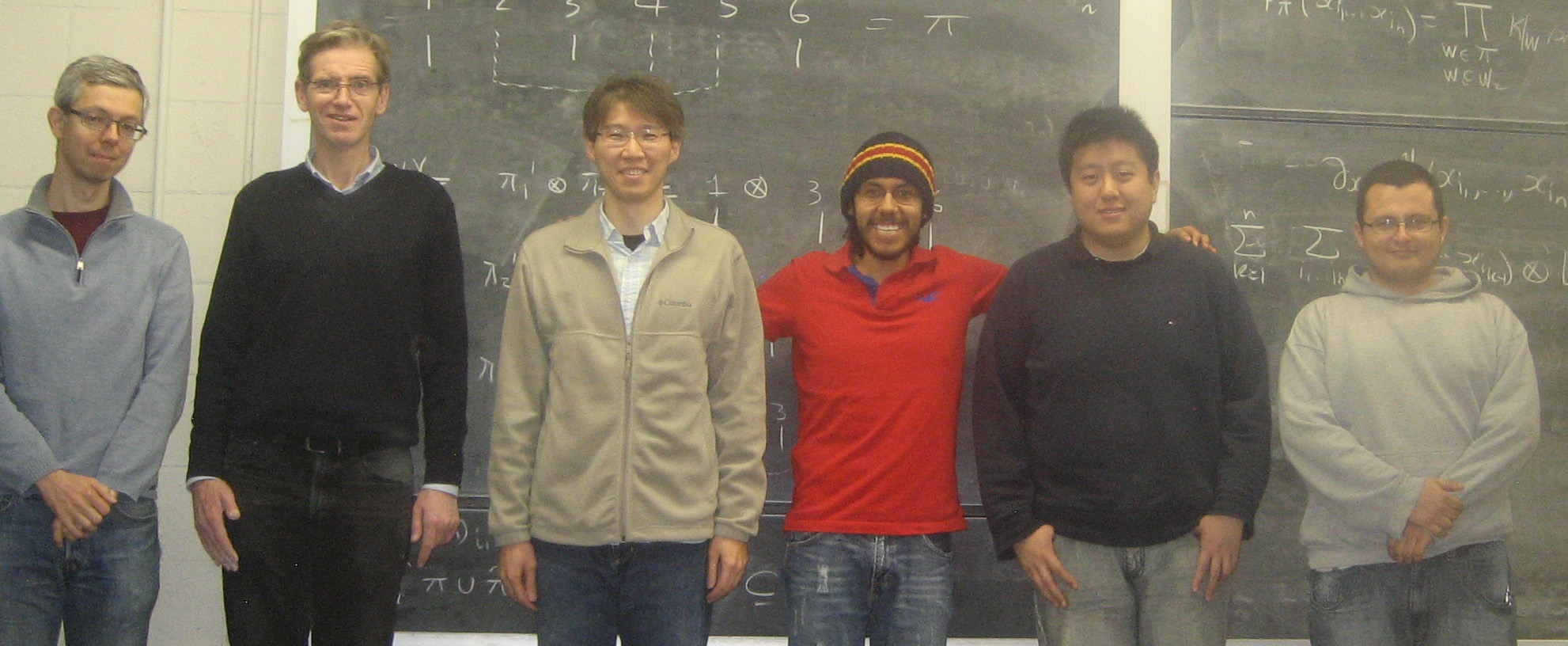
Thursday, December 3, 4:30 - 6:00, Jeff 110
Second Order Cumulants of Partially Transposed
Matrices, II
This will be a continuation from November 26.
Thursday, November 26, 4:30 - 6:00, Jeff 110
Second Order Cumulants of Partially Transposed
Matrices
I will review the construction of second order
cumulants and work out the semi-circular case. I will
then show how to compute these for partially
transposed Wishart matrices.
Thursday, November 19, 4:30 - 6:00, Jeff 110
Josué Daniel Vázquez Becerra (Queen's)
Second order freeness: a free probability study of
fluctuations of random matrices, III
This will be a continuation from November 5.
Thursday, November 5, 4:30 - 6:00, Jeff 110
Josué Daniel Vázquez Becerra (Queen's)
Second order freeness: a free probability study of
fluctuations of random matrices, II
This will be a continuation from the previous week.
Thursday, October 29, 4:30 - 6:00, Jeff 110
Josué Daniel Vázquez Becerra (Queen's)
Second order freeness: a free probability study of
fluctuations of random matrices
Second order freeness is a feature exhibited in the
large $N$ limit by random matrix ensembles such as the
orthogonal Gaussian random matrices and the orthogonal
Wishart random matrices. Its main purpose is to help
determine the asymptotic behaviour of the covariance
of traces of products of random matrices; this is
comparable to the description of the asymptotic
behaviour of the expectation of the trace of products
of random matrices that we get from freeness.
In this talk, we will give the definition of second
order freeness and present some of the most relevant
work related to it
Thursday, October 8, 4:30 - 6:00, Jeff 110
On the Speed at which Asymptotic Liberation Sequences
Deliver Freeness
It is well known that certain ensembles of unitary
matrices deliver asymptotic freeness under suitable
conditions. Related to the intuitive question about
how random an ensemble must be in order to deliver
freeness, Anderson and Farrell found a unitary
ensemble which is “less random” than the Haar
distributed ensemble originally proposed by
Voiculescu. In this talk we propose to study the speed
at which these ensembles deliver freeness as an
alternative measure of “randomness”. This is joint
work with Jamie Mingo.
Thursday, October 1, 4:30 - 6:00, Jeff 110 (note
room change)
The Partial Transpose of Unitary and Orthogonal
Matrices, II
This will be a continuation from last week.
Tuesday, September 22, 4:30 - 6:00, Jeff 422
The Partial Transpose of Unitary and Orthogonal Matrices
In quantum information theory a frequently used test
for entanglement is the positive partial transpose
test. For a Wishart matrix Aubrun found the aspect
ratio that guarantees a non-positive positive partial
transpose and thus entanglement. Mihai Popa and I
considered the interaction between a Wishart matrix
and its partial transpose. We showed that the matrix,
its full transpose and its partial transposes are
asymptotically free. In this talk I will consider what
happens when we consider orthogonal and unitary
matrices.
Tuesday, September 15, 4:30 - 6:00, Jeff 422
Matrix Cumulants and the Topological Expansion
I will discuss how matrix cumulants, defined by
Capitaine and Casalis (2007) in terms of a
convolution, connect to diagrammatic methods of
calculating matrix integrals, and how these tools are
particularly useful in the multi-matrix setting. I
will focus on the real case, and consider also how the
complex case is related. I will also discuss how this
approach is useful in the quaternionic case, in
particular in problems involving partial traces.
I will also discuss some of the tools useful for
analyzing the non-orientable diagrams which appear in
the real and quaternionic cases.
Previous Schedules
Getting to Jeffery Hall from the Hotel Belvedere


